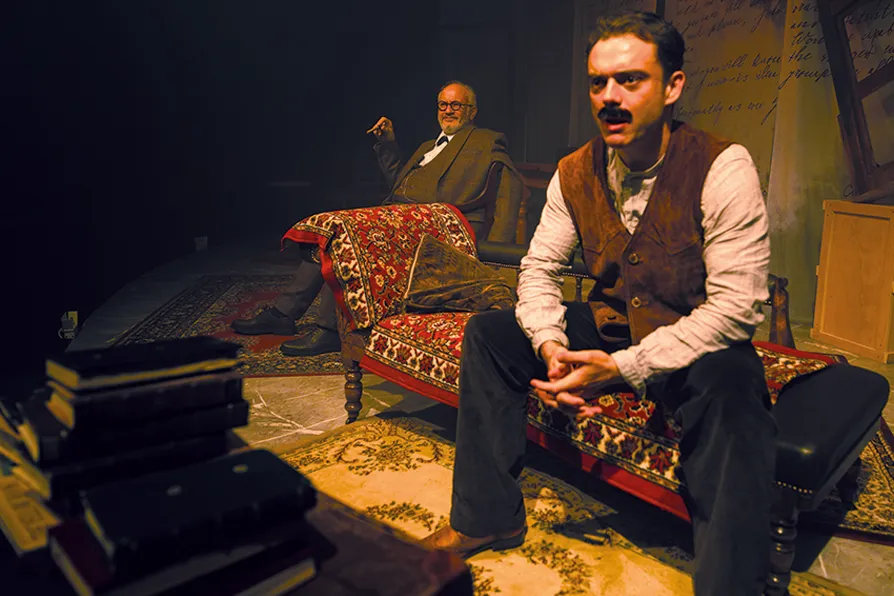RITA DI SANTO draws attention to a new film that features Ken Loach and Jeremy Corbyn, and their personal experience of media misrepresentation
JAN WOOLF is beguiled by the tempting notion that Freud psychoanalysed Hitler in a comedy that explores the vulnerability of a damaged individual

 RISKY CHARM: Sam Mac as Hitler and Jonathan Tafler as Freud [Pic Simon Jackson]
RISKY CHARM: Sam Mac as Hitler and Jonathan Tafler as Freud [Pic Simon Jackson]
Dr Freud will see you now, Mrs Hitler
Upstairs at the Gatehouse, London
★★★★★
IT starts with Hannah Danson’s set. An installation of sheets of text, a table and lowered lights, some doorframes askew; the symbolism of it all. Sets us up too, for something intriguing.
As the lights lower, we hear the scream of a child, the shadow of a man behind the sheets flitting off to beat the child. Great work from lighting designer Simon Jackson. It’s like something from the Brothers Grimm; a tales from the dark forests of northern Europe — and our psyches.
Lights up as a Mrs Hitler asks a Dr Bloch about this new psycho-stuff, and could someone see her son, Adolf, who wets the bed and has nightmares. But father Alois refuses to send him.
The factual ends there — and the fictional drama starts — a plausible one with great emotional truth as the seven-year-old Adolf Hitler meets Dr Sigmund Freud in a moment of touching symbolism. Literally. Thus begins a tentative relationship that Hitler has with the Freud family, both on and off the couch. Hitler as Freud’s house painter? A great conceit, and it works.
“So, I am memorable?” says Adolf, after overhearing something — erm… — memorable about himself from Freud. His art is dismissed by Freud as “lacking something” even though 13-year-old Anna likes it enough to make her father buy a couple of drawings. Adolf wants Anna to like him — and she does — but not that much.
Adolf would “probably make a competent customs officer like his father — if he can pass the examinations,” says Freud. But that’s not quite what Hitler has in mind for his life. Rejected by Jews in his own country. Rejected by the art academy, the play builds, and so do the infamous Hitler gesticulations. And the anti-semitism.
Twenty years later, with Hitler the leader of a greater Germany, the Gestapo turn up at Freud’s house and ransack his books. Mein Kampf is among them, inscribed by the Fuhrer: “Now you can have the bad dreams, Dr Fraud.” Had the Freuds let him stay as a holiday house guest; would he have even written the damn thing?
All Adolf really has left is being German in his own country. His reductive summary runs: I’m a crap artist, unattractive to women, but at least I am German, and white, and Aryan white come to that. Prescient?
This play is a result of many years of research and commitment by accomplished comedy writers Laurence Marks and Maurice Gran. Maybe this could only be done as comedy. The wit the timing and the irony allow the awful truths of the consequences of the shaming of this particular individual to slip down.
Isaac Bernier Doyle’s direction brings forth the comedy, pathos and the tragedy. Chromulume Productions have assembled a fine cast. Jonathan Tafler’s Sigmund Freud is clever and urbane, wearing his intelligence as beautifully as his well-cut suit. Is he the father figure that Adolf might have wanted? The one he dreams up in his hospital bed in WWI as he lies gassed and temporarily blinded, with a fascistic doctor wanting to get him back to the trenches. A brilliant scene.
Sam Mac as Hitler takes on the role with skill and subtlety, as vulnerability turns to paranoia at a perceived insult or rejection. Ruby Ablett plays Anna Freud as all wide eyed and intellectually curious, then maturing as the woman who needed to leave Nazi Germany.
Fine acting too from Nesba Crenshaw, doubling up as Klara Hitler and Martha Freud. Brendan Lyle and Neil Chinneck play other roles in terrific ensemble playing. Chinneck’s Carl Jung is interesting, setting up profound disagreements between himself and Freud. It turns out that some of the Nazis quite like Jung. The couch — in itself a character — is lugged on and off the set.
The play explores that most fundamental subject — the reductive relationship between a person and their country, and when this becomes a pathology, like the hero blacksmith with wings of steel in the opera that Adolf is dreaming up. Hitler, observes Freud, is a creature of dreams: bad ones at night, good ones by day.
Fascism comes from the old Roman word fasces, meaning bundles of sticks, where the individual is lost. And this spectacularly lost “Greater German” murdered millions and changed the world. Would psychoanalysis with the world’s great shrink have changed that? We can’t ever know, but this play suggests that he did lie on the couch, and just that it didn’t go too well.
Runs until September 28. Box office: (020) 8340-3488, upstairsatthegatehouse.com.

JAN WOOLF ponders the works and contested reputation of the West German sculptor and provocateur, who believed that everybody is potentially an artist

JAN WOLF enjoys a British revival of the 1972 come of age farce/panto Pippin

FRANCIS BECKETT introduces his new play that aims to give its audience a taste of what a far-right triumph would be

JAN WOOLF finds out where she came from and where she’s going amid Pete Townshend’s tribute to 1970s youth culture










